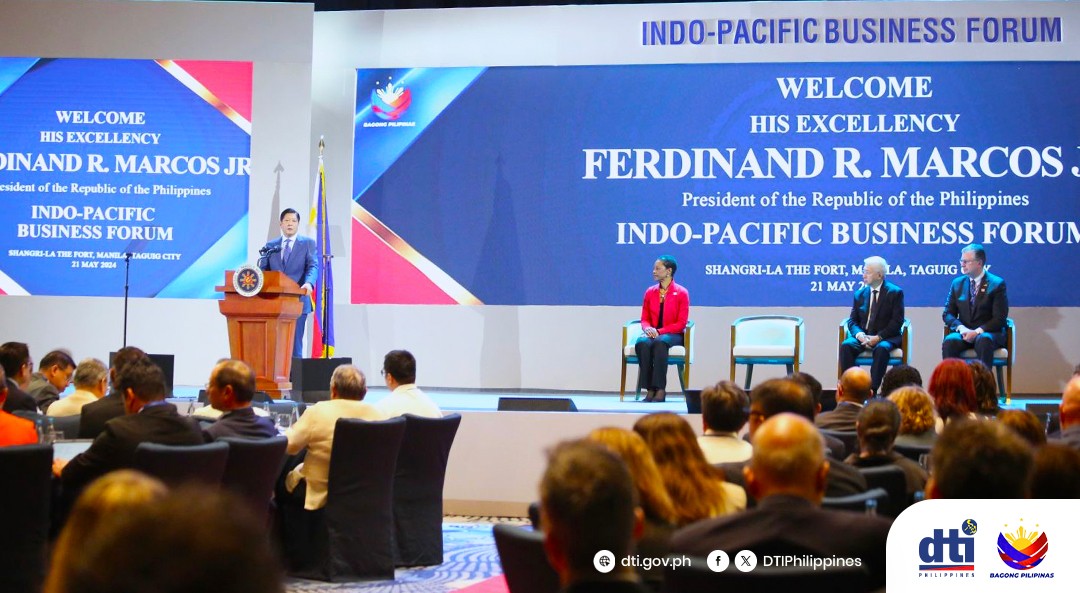

MANILA – President Ferdinand Marcos, Jr. bared today the economic achievements of the Philippines, solidifying the country’s important role in the Indo-Pacific region and as an ideal investment destination for potential U.S. businesses and investors.
In his speech during the 2024 Indo-Pacific Business Forum in Taguig City, President Marcos showcased the achievements of the country, particularly the 5.5 percent GDP growth in 2023, surpassing major economies in Asia, based on the latest available data.
“As the Philippines occupies a strategic position in the Indo-Pacific, we are leveraging our strategic geopolitical location, economic engagements, and participation in regional agreements,” Marcos stated.
“With this region accounting for over one-third of global economic activity, this presents immense opportunities for our nation. We are proud to be a major contributor, with our GDP ranking amongst the fastest-growing in the region, coupled with our burgeoning population, and significant trading outputs,” Marcos added.
According to Marcos, foreign direct investments (FDI) continue to flow in, with four consecutive months of expansion, as well as the increase of investment pledges, reflecting a healthy pipeline of inward FDI.
Marcos added that Indo-Pacific Economic Framework for Prosperity (IPEF) partner countries play a significant role in the Philippines’ robust economic growth, contributing substantially to the country’s FDI and other approved investments.
Meanwhile, President Marcos highlighted his administration’s efforts in positioning the Philippines into a regional hub for smart and sustainable manufacturing and services, agribusiness and logistics in the Asia-Pacific, specifically collaborations with IPEF partner countries on the Luzon Economic Corridor.
According to the President, the government has earmarked key projects to spur growth in the Luzon Economic Corridor, creating strategic connections between Subic, Clark and the CALABARZON region, as a prime location for export-manufacturing firms.
“Through these economic strengths, we aspire to transform the Philippine economy into a regional hub for smart and sustainable manufacturing and [services],” Marcos emphasized.
“These initiatives will enhance freight transport services, mobility, and access to key economic zones, ensuring business continuity and positioning the Philippines as a regional hub for agribusiness and logistics in the Asia-Pacific,” the President added.

President Ferdinand R. Marcos Jr. delivers his speech during the Indo-Pacific Business Forum (IPBF) in Taguig City on Tuesday, saying the Philippines is steadfast in its commitment to foster economic growth and international cooperation. (Photo courtesy of Presidential Communications Office and Department of Trade and Industry)
Renewable Energy and Digital Transformation
The President highlighted the Philippines’ potential for renewable energy (RE) with over 491.821 megawatts from various sources like geothermal, hydropower, solar and wind.
Marcos then shared recent amendments to the Renewable Energy Act, allowing 100 percent foreign ownership of RE sources, making the country an attractive destination for clean energy investments.
He also said that the Philippines is embracing digital transformation, making sure that micro, small, and medium enterprises (MSMEs) are equipped with the necessary tools to become a sustainable business.
Marcos also said that the Philippines offer a strategic location “with a robust experience and record” in the IT-BPM competencies, with a strong direction towards upgrading Business Process Outsourcing into Knowledge Process Outsourcing, such as market intelligence, business analytics, legal services, and AI.
Infrastructure and Transportation
Marcos underscored the government’s efforts to transform the nation’s infrastructure landscape through the “Build Better More” infrastructure program, encompassing 185 priority projects worth PHP 9.5 trillion, which he hopes to contribute to the goal of becoming the next logistics hub in Asia.
The Philippines is also investing in transportation, from roads to ports, [and] airports with the intention to create a transport network that is safe, efficient, and accessible to everyone, as well as embracing new technologies to make transport systems smarter and more responsive to changing needs, Marcos said.
Mahalika Investment Fund
President Marcos mentioned the Maharlika Investment Fund as being “pivotal in our goal of creating more opportunities for future generations.”
According to Marcos, “the fund plays a vital role in financing critical infrastructure projects, stimulating economic growth, and generating long-term returns for the benefit of all Filipinos.”
“Additionally, the recent establishment of the Maharlika Investment Fund (MIF), our sovereign wealth fund, demonstrates our strong commitment to strategically invest in key sectors that will accelerate national development,” Marcos stated.
LEGISLATIVE REFORMS
In terms of legislation, Marcos said the country is committed to creating a conducive business environment through what he calls “game-changing” reforms such as the Corporate Recovery and Tax Incentives for Enterprises or CREATE Act, and initiatives like the Ease of Doing Business Act and the Green Lanes For Strategic Investments Executive Act.
“Through this, we are making the Philippines even more attractive for investments, both local and foreign,” the President said.
“Through these reforms, we assure you that the Philippine government is fully committed to supporting and facilitating your business endeavours in our country,” Marcos added.
The Indo-Pacific Business Forum (IPBF) is spearheaded by the U.S. Trade and Development Agency, in partnership with the U.S. Department of State.
In its website, it stated that the IPBF is expected to connect CEOs, project developers, government officials, and sources of financing for priority infrastructure in emerging Indo-Pacific economies.
Through speeches, breakout panels, and business matchmaking, participants will learn and share their insights on the latest trends, opportunities, and solutions to support infrastructure across all sectors, the IPBF website added.




